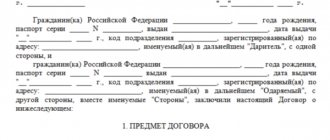There is an opinion that obtaining official registration at a specific address not only gives the tenant almost unlimited rights to use the premises, on an equal basis with the owner, but also prevents his eviction without consent.
Meanwhile, this is not entirely true. In certain cases, it is possible to deprive a person of registration, and on completely legal grounds, defined by regulations.
Legislative regulation of the issue
Of course, from the first minute of registration, a person receives certain rights, as well as responsibilities enshrined in Article 31 of the Housing Code of the Russian Federation.
That is, a citizen installed by the owner of the home as a family member on an equal basis with the owner, and in the event of his absence, instead of him, is obliged to at least:
- pay bills for consumed utilities;
- maintain the living space in proper condition;
- use real estate for its intended purpose;
- do not violate the interests of neighbors.
By the way, it is worth noting that in some cases the same sister or second cousin can even register their newborn child without the consent of the property owner, given that babies automatically receive registration similar to their parents by virtue of Article 70 of the Housing Code of the Russian Federation.
also acquire the right to use residential premises in the following situations:
- privatization, during which they will refuse to participate in this procedure in favor of another family member and thus acquire the right to live in an already privatized apartment for life;
- when drawing up a rental agreement with lifelong maintenance, which also implies the right to use housing until death.
It is worth noting another fairly common situation that gives the right to residence, in particular, we are talking about housing in which spouses live, even if it was acquired before marriage by one of them. That is, while the couple is married, they use the house equally, but after a divorce, the question arises of not only moving, but also canceling the registration.
Thus, at first glance, in all the cases described above, citizens legally live in residential real estate and are endowed with certain rights, while not being the owners, and it is at first glance impossible to write them out without their consent, however, such cases are still provided for by law, to for example, in the same article 35 of the RF LC or in part 5 of article 31 of the RF LC.
Reasons for implementation
As a rule, the question of eviction of a certain citizen arises only in two cases :
- termination of family ties;
- deterioration of interpersonal relationships.
However, there are also less common cases provided for by law, in particular:
- transfer of residential real estate by inheritance or gift to other persons who are not related to the residents by blood or who are only distant relatives;
- deprivation of parental rights, which threatens the same negligent father with eviction if the living space belongs to the child and his mother;
- use of the apartment for other purposes;
- mismanagement of housing, involving violation of the rights of neighbors and the threat of destruction within the framework of Article 35 of the Housing Code of the Russian Federation;
- long absence from the place of registration and refusal to pay utility and household bills.
That is, despite family ties and relation to a preferential category, a person may lose his rights to use property, but taking into account the norms of the law.
For example, on the basis of Article 70 of the Housing Code of the Russian Federation, it is impossible to discharge a child under 14 years old even to his grandmother, even with all the desire, so at the initial stage the issue of eviction of the baby’s father and mother is decided, and then about the re-registration of the baby. Difficulties may also arise when discharging your ex-wife. Indeed, by virtue of Article 31 of the Housing Code of the Russian Federation, from the date of divorce she will no longer have the right to live in her husband’s housing, but only if she has her own and has no dependents.
If a woman is left with a common child and does not have her own apartment, the court may oblige the ex-spouse to provide her with another living space, and before that, she will retain the right to use the apartment, but for a certain time, for example a year, especially if Dad is also obliged to pay her child support.
Peculiarities
Dear readers! The article talks about typical ways to resolve legal issues, but each case is individual. If you want to find out how to solve your particular problem , contact a consultant:
+7 (499) 938-81-90 (Moscow)
+7 (812) 467-32-77 (Saint Petersburg)
8 (800) 301-79-36 (Regions)
APPLICATIONS AND CALLS ARE ACCEPTED 24/7 and 7 days a week.
It's fast and FREE !
According to statistics, real estate can belong to citizens by right of ownership or after concluding a social tenancy agreement. Any tenant has the right to allow and include his family member on the property. This also applies to my husband.
In this case, the person has the right to use the housing facility, including residence. Registration at the place of residence takes place quickly, without additional agreements.
Each citizen acquires long-term registration at the place of residence. This procedure is a mandatory action, but only in a situation where they are members of the owner’s family. But if the spouses divorce, then the right to use may disappear.
There are several situations, and based on them we can say whether a former relative will check out of the apartment or not.
Judicial resolution of the issue
Download a sample statement of claim to the court requesting the eviction of a tenant from a residential property.
As a rule, the court does not have the right to refuse to accept a statement of claim, with the rare exception of a violation of the claim procedure itself.
That is why it is possible to file an application in court, but a positive result will not always be guaranteed. The fact is that each situation is considered not only individually, taking into account all the variables and interests of the parties, but also on the basis of the evidence presented, which is quite difficult to collect.
In particular, the court will necessarily take into account the following circumstances :
- divorce, confirmed by a certificate from the registry office;
- acquisition of property rights by another person on the basis of the same will or deed of gift, as well as a certificate of registration of ownership of a new person;
- deprivation of the rights of a parent, which can be proven through a court decision and documents on the right of ownership of residential real estate by the child and his mother, under whose guardianship he remains.
But it will be possible to prove the fact of misuse of residential premises only through the testimony of neighbors and inspection reports drawn up by representatives. By the way, damage to property or misuse of it will also require an inspection and the drawing up of appropriate acts, not to mention at least several complaints from neighbors sent to local governments in writing.
Separately, I would like to note the procedure for eviction of persons who do not participate in privatization , but have the right of lifelong residence. This category is, in theory, protected by law, but they can also be forcibly discharged, especially if they do not live at their place of registration, and for a long time and do not participate in the maintenance of residential real estate, as well as payment of monthly payments, which is again confirmed by the act of not accommodation and certificate of utility debt .
That is, the owner’s mere desire to discharge the same stepdaughter with whom the stepfather cannot get along will not be enough. It is necessary to prove that her residence violates the rights of the owner, and also does not affect the constitutional rights of the girl, given that before the court both the plaintiff and the defendant are equal.
Security of the purchase and sale transaction
When purchasing, you need to find out in advance about the registered people. It is worth visiting the passport office and getting an official extract from the house register, which stores information about residents who are registered at the desired address.
If additional guarantees are needed, you should order information from the archive. The papers indicate persons who have a lifelong right of residence in a specific area. But this certificate is difficult to obtain; passport office employees are reluctant to carry out the procedure.
After an official refusal, you can contact a legal agency dealing with real estate issues. Qualified employees will assist in resolving the situation.
Disadvantages of housing with registered people
It’s a rather reckless move to buy an apartment where an indefinite number of people are registered. There are different situations, but before purchasing you need to carefully study all the information. If a person completely trusts the former owner, then it is not necessary to immediately check him out of the apartment. This is also done after the transaction is completed, if there are good reasons for this.
However, there may also be unscrupulous sellers who create problems for the new owner of the property. They refuse to voluntarily move out of the apartment and, after receiving the money, use it as before. The only chance to organize legal consequences is to go to court with an official statement.
The main problem and disadvantage are citizens who cannot be officially evicted from a newly acquired apartment.
Legal advice
The procedure for eviction of a former owner is a complex process. You should contact a lawyer for advice.
The new owner does not have the right to restrict the movement of certain persons around the living space, since they are “protected” by official registration and are authorized to use even the sold property, including in situations where the owner has changed.
This state of affairs is extremely delicate and complex. Competent lawyers advise not to enter into conflicts and not to evict people using physical force, because they can call the police, for which they have legal grounds.
To resolve the situation, it is necessary to carry out the official deregistration procedure and receive a departure certificate. Only after these events have been carried out will the registered persons be officially considered strangers in the apartment.
How to register former owners? Consultation with a lawyer
Options for providing housing in return
Of course, in a number of cases, especially with sufficient grounds, the court agrees to meet the owners and makes a decision to evict a citizen, especially if we are talking about a change in the owner of real estate. But in other cases, burdened with close family ties, the decision is not so clear-cut.
In particular, if we are talking about former spouses who lived in the husband’s apartment, purchased before marriage, and also have children together, the court may side with the mother, especially if the man is also obliged to pay alimony. After all, if a woman does not have her own home and the funds to buy it, the judge will definitely decide to extend her right of stay for at least another 12 months or oblige the so-called father to provide other accommodation for both the child and his mother, and at his expense.
There may also be options for eviction from municipal housing , which belongs to the state. Indeed, in most cases, citizens are provided with social apartments only after they are recognized as needing improved housing conditions under an agreement drawn up under Chapter 8 of the Housing Code of the Russian Federation. Therefore, if a citizen does not fulfill his obligations, he may be evicted or given an apartment or even a smaller dorm room.
In all other cases, burdened with violation of the rights of neighbors and misuse of housing, the court, as a rule, takes the side of the owners, given that no one will and is not obliged to tolerate a drunken brawl, a cattery or a warehouse in an ordinary apartment, especially if the violators have their own housing.
Procedure for going to court
Before going to court to remove an unwanted tenant, the owner needs to take into account several mandatory aspects , without which consideration of his issue will be impossible.
In particular, we are talking about :
- jurisdiction, that is, filing a claim only in the court of first instance or the district court, which considers cases within the framework of the claim proceedings on the basis of Article 24 of the Code of Civil Procedure;
- jurisdiction, which consists of considering the case at the place of official residence of the defendant in accordance with Article 28 of the Code of Civil Procedure.
You should also take into account the provisions of Article 134 of the Code of Civil Procedure, according to which a claim may be refused in the following cases:
- filing claims for consideration by the court again on the same basis and with the same evidence;
- if there is already a court decision on the same issue.
If the above requirements are met, then the procedure for filing a claim is not particularly complicated. After all, you just need to draw up an application taking into account the norms of Article 131 of the Code of Civil Procedure, attach available evidence and a standard package of documents , namely:
- passports of the parties;
- an extract from the house register about persons registered in the apartment;
- certificate of ownership.
The application will be considered within five days, then a court date will be selected and summons will be sent to the parties. After the meeting, a decision will be made, which will come into force after 10 days, unless there is an appeal, for consideration of which another 30 days are given.
How to discharge your ex-husband from an apartment through the court
To ensure that no problems arise during discharge, and that the ex-wife’s claims are satisfied in full, it is necessary to responsibly approach the preparation of the application and the collection of evidence of the illegality of the defendant’s residence in the apartment. Claims for forced deregistration with subsequent eviction are filed in district courts of general jurisdiction at the location of the disputed real estate.
Procedure
Having decided to permanently sever past ties and evict your ex-spouse from a shared apartment, you need to follow the following algorithm:
- Try again to talk peacefully with the man and convince him to discharge voluntarily.
- In case of refusal, give him a written demand for eviction and subsequent discharge from the apartment. The document must indicate the reasons that prompted you to make such a drastic demand on your roommate. You can read more about the rules for drawing up this document here.
- If the pre-trial stage did not lead to anything, and the man simply ignored requests for an extract, we move on to preparing a package of documents for the court.
- Having attended all the preliminary and main hearings and received a court order to forcibly deregister the defendant, you need to hand over this document to an employee of the regional department of the Migration Department of the Ministry of Internal Affairs of the Russian Federation. Don’t forget to attach an application for the ex-husband’s discharge to the decree.
- If, even after receiving a copy of the court order, the man is in no hurry to leave the apartment, he should seek help from bailiffs, who will come and legally “help” the person move out. You will learn more about this procedure if you read this article.
Procedure
Pre-trial stage:
- peace negotiations with ex-husband;
- delivery of written demands (the form of the document is arbitrary).
Preparing for court:
- write a statement;
- We collect evidence confirming the illegality of the defendant’s residence in the apartment of his ex-wife;
- We pay the state duty.
Trial stage:
- we transfer the claim along with other necessary documents to the court office;
- We come to the hearings at the appointed time and defend our case;
- after the main hearing, if the claims are satisfied by the court, we receive a writ of execution for the defendant’s discharge;
- If the court considers the grounds you provided for your discharge to be insufficient, an appeal is filed.
We write out the ex-husband:
- We attach to the copy of the writ of execution an application for compulsory discharge, written on your behalf, and hand it over to an employee of the regional division of the Migration Department of the Ministry of Internal Affairs of the Russian Federation;
- in three days, your ex-husband will be finally discharged from your apartment, and you will have every right to ask him to move out of the house as soon as possible.
The presence of the defendant when submitting the application to the registrar is not required. The application form can be taken from the Department of the Internal Affairs Directorate of the Ministry of Internal Affairs of the Russian Federation, and there are also examples of how to correctly fill out this document on stands there.
Statement of claim
An application to the court must consist of several mandatory parts; the absence of at least one of them will be a reason for refusing to accept the claim:
- Introductory part (written in the upper right corner of the sheet):
- full name of the court;
- Full name of the plaintiff and his contact information;
- Full name of the defendant and his contact information.
- Document title (written in .
- Descriptive part:
- we describe the essence of the problem in detail, but without excessive emotionality;
- each argument brought against the defendant must be supported by documents or testimony;
- the more arguments, the better;
- if the defendant has alternative housing on his property, be sure to indicate this.
- Motivational part:
- flows smoothly from the descriptive one, doesn’t stand out in any way, we just start writing a new paragraph;
- lists the legislative norms regulating the controversial situation, on the basis of which the plaintiff concluded that his rights had been violated and that it was advisable to defend them in court.
- Request to the court:
List all the requirements, in our case these are:
- forcibly remove the ex-husband from registration at the place of residence;
- forcefully evict him from the disputed apartment;
- to recover arrears in utility bills and other material damage incurred by the plaintiff for the entire period of the defendant’s illegal residence in the apartment (if any).
At the end of the document, you must list all the documents attached to it, then put a date and signature.
Documentation
Before submitting a correctly drawn up claim to the court office, you should attach a package consisting of the following documents:
- plaintiff's passport;
- documents on the basis of which the ownership of the disputed housing arose;
- extracts from the Unified State Register of Real Estate;
- extracts about all residents from the apartment register;
- divorce certificates;
- receipts for payment of state fees;
- birth certificates of joint children (if any).
Price
In order to forcibly expel your ex-spouse from the apartment, you will have to incur the following expenses:
- court fee – 300 rubles;
- services of migration authorities - free of charge;
- legal services (optional) - according to the price list of the law office.
Deadlines
The actual extract from the moment of submitting the relevant application to the migration authorities will take exactly three working days. But in the case of forced eviction of an ex-spouse, it is necessary to take into account the duration of the litigation, namely:
- checking the claim for correctness and acceptance of it for work – 5 days;
- court hearings and a decision to remove the defendant from registration by the court of first instance - 2 months.
If the defendant decides to appeal the decision, the procedure may drag on for several more months.
Procedure for executing a court decision
Of course, the process of eviction, especially without the consent of the tenant, is not simple, therefore, at the initial stage, the same owner can, in pre-trial order, send him an official appeal with a request to vacate the occupied premises within a certain period, for example, two weeks. If no further action is taken or a refusal is granted, the court decision comes into force, the execution of which will be monitored by bailiffs.
That is, when the decision comes into force, it will be sent to the bailiffs, who, within the framework of Article 30 of Federal Law No. 229, issue a resolution to initiate enforcement proceedings and send the defendant a notice of the need to leave the apartment within the period established by the specified document. If the bailiff's request is not fulfilled, a second notification follows, indicating a new eviction date. But already forcibly.
Methods of implementation
By virtue of Article 25 of the Constitution of the Russian Federation, a citizen’s home is inviolable, and without his permission no one has the right to enter it, much less evict it, except in cases where there is a court decision. That is, the bailiffs have every right to visit the disputed apartment and forcibly remove the citizen from it, but only in the presence of witnesses who will attest to the fact of the eviction legally in the act.
By the way, at the same time as the citizen, his things will be taken out, but only after the mandatory preparation of a detailed inventory of them, then they will be delivered to another address indicated by the former tenant. Naturally, the citizen’s keys will be taken away, and they will also be warned that he can no longer use the apartment, in view of the fact that, upon the bailiff’s appeal to the Federal Migration Service, he will have already been deregistered by that time.
Application Form
The application is drawn up in any form, but must contain the following information :
- name of the department to which the application is addressed. It is written in the upper right corner of the document;
- last name, first name and patronymic of the applicant, address of his temporary registration;
- information about the exact registration period, indicating the start and end dates of registration;
- the date from which the applicant wishes to be deregistered;
- date of document preparation;
- applicant's signature with transcript.
Ask questions in the comments to the article and get an expert answer
Protecting the rights of the evicted
Of course, few of the persons registered in residential real estate, but not its owner, agree with forced deregistration. And yet, if there are sufficient grounds for this, they will be discharged. However, they also have rights, especially if these citizens belong to a preferential category or there are other prerequisites for suspending the eviction.
In particular, it is impossible to forcibly expel a child under 14 years old from an apartment, given that even in the usual manner the guardianship authorities are on guard. Difficulties may also arise when deregistering a citizen who is in prison or undergoing treatment in a psychiatric hospital . And of course, it will not be possible to simply evict tenants of residential premises who, under an agreement, occupy it for a certain period.
Moreover, if the evicted person does not belong to the above categories, he also has rights. In particular, for the same appeal of a court decision , of course, with sufficient documented grounds, for example, about the absence of another home in the property, especially if we are talking about former spouses or relatives by blood, the same stepdaughter or mother-in-law .
To learn how to evict a former family member from an apartment, watch the following video:
Eviction of a cohabitant, whether he is registered or not
Evicting a cohabitant is a simple situation, because a person who is not a legal husband or relative can use the property only with the consent of the owner. The only exception is the status of a dependent if the citizen is a minor or is registered on square meters.
Discharge of ex-spouse through court
Step-by-step algorithm of actions:
- Talk to the person and try to resolve the issue amicably.
- Write a complaint to law enforcement agencies. The local police officer is obliged to respond and conduct a conversation with the roommate.
- If these conversations do not produce results, then you need to file a claim and appeal to a higher authority.
Even if the common-law spouse protests the court’s decision on the grounds that living together is a marriage, this will not affect the final verdict. It is enough to indicate in the application that there is evidence that the person is not related, is able to work and creates difficulties for living together.
A sample statement of claim for eviction of a cohabitant is available for download here.







